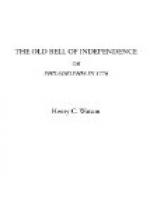“According to the account of some who were present, the number that sallied out was five hundred, and of those who escaped the scalping-knife two hundred. Others assert that the sortie consisted of but three hundred, and those who escaped were less than one hundred. The probability is that, between the confusion, carnage, and panic of the day, the accounts are all incorrect. But, by every account, about three hundred able-bodied men, amounting to more than half the settlement, were slain on that dismal day.
“The fugitives fled in every direction. Some saved themselves by fair running; some, by hiding till the darkness covered their retreat; and many by swimming the river, &c. Particular details of all individual escapes cannot be given; nor would they, perhaps, be entertaining, and I shall, therefore, pass them over. Some few of the enemy were killed in the pursuit; their total loss was never ascertained, but we are to presume that it was small.
“Forty Fort was immediately evacuated. Some few of the inhabitants took British protections, and remained on their premises. The signal for a house under protection was a white cloth hung up near the door, and for a man, a white rag round the crown of his hat.
“Those of the militia who escaped from the battle, hastened toward the Delaware, and, on their way through the swamp, met Captain Spaulding’s detachment, who, on being informed of the strength of the enemy and deplorable condition of the settlement, judged it prudent to turn about and retire to the settlement on the Delaware.
“The road through the swamp was thronged with women and children, heavy-hearted and panic-struck; destitute of all the comforts of life, travelling day and night, and in continual dread of the tomahawk and scalping-knife! The whole country, and all the property in it, was abandoned to the savages, save only by the few who had taken British protections.
“Colonel Nathan Dennison, who succeeded to the command after Butler escaped, seeing the impossibility of an effectual defence, went with a flag to Colonel John Butler, to know what terms he would grant on a surrender; to which application Butler answered, with more than savage phlegm, in two short words, ‘The hatchet.’ Dennison, having defended the fort till most of the garrison were killed or disabled, was compelled to surrender at discretion. Some of the unhappy persons in the fort were carried away alive; but the barbarous conquerors, to save the trouble of murder in detail, shut up the rest promiscuously in the houses and barracks, which they set on fire, enjoying the savage pleasure of beholding the whole consumed in one general blaze.
“They then crossed the river to the only remaining fort, Wilkesborough, which, in hopes of mercy, surrendered without demanding any conditions. They found about seventy continental soldiers, who had been engaged merely for the defence of the frontiers, whom they butchered with every circumstance of horrid cruelty. The remainder of the men, with the women and children, were shut up, as before, in the houses, which being set on fire, they perished altogether in the flames.




